Graham Reid | | 4 min read
My Obsession
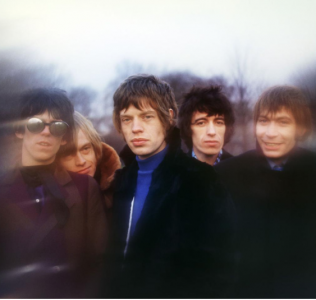
The shorthand for the Rolling Stones' recording career before Exile on Main Street is usually reduced – even by Stones' fans – to something like this: some blues and r'n'b covers albums with a few originals thrown in, Aftermath in '66 where they wrote everything themselves and so is a classic (it's not, it's flawed like most Stones' albums), the substandard foray into Pepper-style psychedelics with Satanic Majesties in '67, then back on track with a great run of blues and country-based rock with Beggar's Banquet, Let It Bleed and Sticky Fingers up to Exile ('72).
What that fails to account for however is their increasingly confident run of UK singles from covers (even their take on Lennon-McCartney's I Wanna Be Your Man is utterly and distinctively the raw Stones) to originals which moved from pop to rock with social comment (Satisfaction, Get Off Of My Cloud, 19thNervous Breakdown, Mother's Little Helper).
Those songs are found on excellent collections such as High Tide And Green Grass and Through the Past, Darkly (the British versions).
The shorthand also marginalises interesting albums like Between the Buttons in early '67.
The US version added Ruby Tuesday and Let's Spend the Night Together (and took out two tracks) but although recorded around the same time, it is the UK version we turn attention to because that is what they conceived.
And it is a more economic and focused collection of sub-psychedelic pop, country music and eccentricities than Satanic Majesties which followed later in the year.
It is also more Brian Jones' album than any other in their catalogue, he played an array of instruments from kazoo to vibes, horns and organ, and left the guitar playing to Keith Richards.
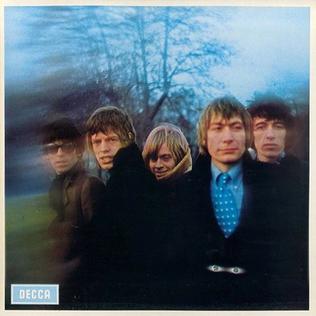 There are musical japes here such as Cool Calm Collected which reaches back to music hall piano (courtesy of Jack Nitzsche) with Jagger on form in a way which sounds like he'd heard the Bonzos. It ends as a pub knees-up.
There are musical japes here such as Cool Calm Collected which reaches back to music hall piano (courtesy of Jack Nitzsche) with Jagger on form in a way which sounds like he'd heard the Bonzos. It ends as a pub knees-up.
There's certainly some of the Jagger misogyny here as he revealed on Under My Thumb. This time it's the pop-rock of Yesterday's Papers (“who wants yesterday's papers, who wants yesterday's girl”) with Jones on vibes and Richards on fuzzbox guitar.
Drugs are here too, disguised as a relationship on Connection (“I just can't make no connection”) but overt on the jaunty Kinks-like Something Happened to Me Yesterday (“Something happened to me that I can't speak of right away”) with Mick and Keith alternating on verses (Mick as music hall Dylan, Keith confident on the bridge) with Jones as the brass band.
It's not a great song and pointed the way to their shapeless pieces of Satanic Majesties but at least had the virtue of focus.
All Sold Out is dark psychedelic pop and again Jones colours it (recorder) with Ian Stewart on piano, whose work also elevates the handclap My Obsession with Charlie Watts echoing his Get Off Of My Cloud beat.
Who's Been Sleeping Here? is their amalgam of Dylanesque lyrics and country music of the kind which would reappear more fully rounded on Beggar's Banquet (notably Jigsaw Puzzle).
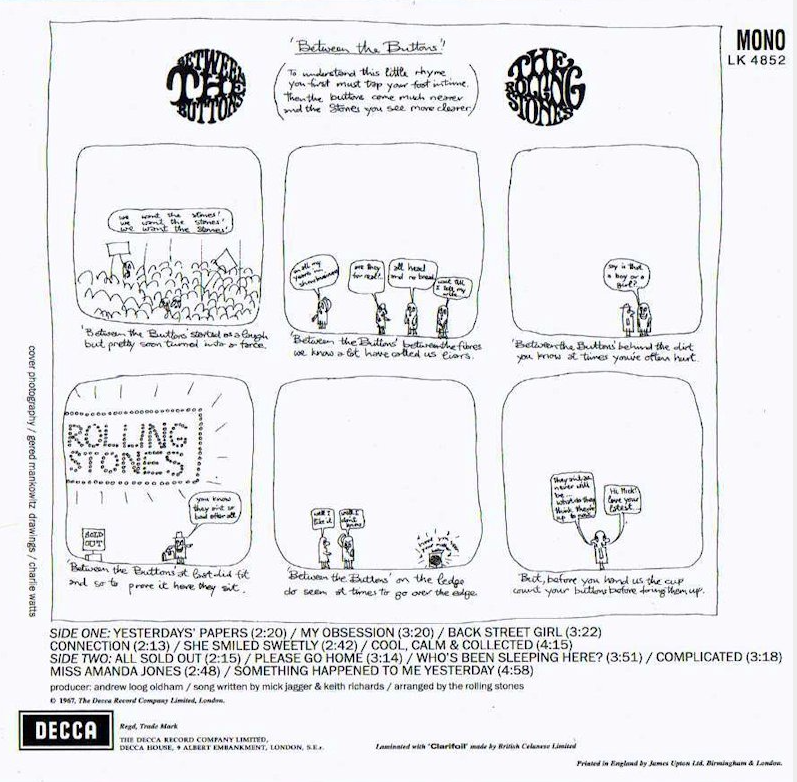 Between the Buttons came in one of their most beguiling Gered Mankowitz covers with Jones out of it and playing up, a Charlie Watts cartoon strip on the back where he writes under the first panel “Between the Buttons started as a laugh but pretty soon turned to farce”.
Between the Buttons came in one of their most beguiling Gered Mankowitz covers with Jones out of it and playing up, a Charlie Watts cartoon strip on the back where he writes under the first panel “Between the Buttons started as a laugh but pretty soon turned to farce”.
It was the Stones' most eclectic and in fact experimental album to date, but was pulled into shape by Jagger-Richards pop sensibilities.
It was also the last produced by their then-manager Andrew Loog Oldham.
As Nigel Goodall noted in Jump Up: The Rise of the Rolling Stones, “[Andrew] always wanted the Stones to make the kind of records he wanted to listen to himself; songs about bitchy models, bored housewives and derailed heiresses . . .”
To some extent that is true here, but it also rocks out on songs like their retro r'n'b of Miss Amanda Jones which is Chuck Berry dragged into a jaded London nightclub of the time. Richards could have written it in his sleep and it's their most straight-forward rock'n'roll song on Between the Buttons, and Jones doesn't appear on it.
Please Go Home reaches back to their early Bo Diddley-influenced version of Buddy Holly's Not Fade Away to no great effect.
Back Street Girl was perhaps the strongest song on it. It was Jagger talking about class again (“don't want you out in my world just you be my back street girl . . . you're rather common and coarse”) set against accordion and Elizabethan acoustic guitars of the kind they use on Lady Jane. He'd go back to this theme on Beggar's Banquet for Factory Girl.
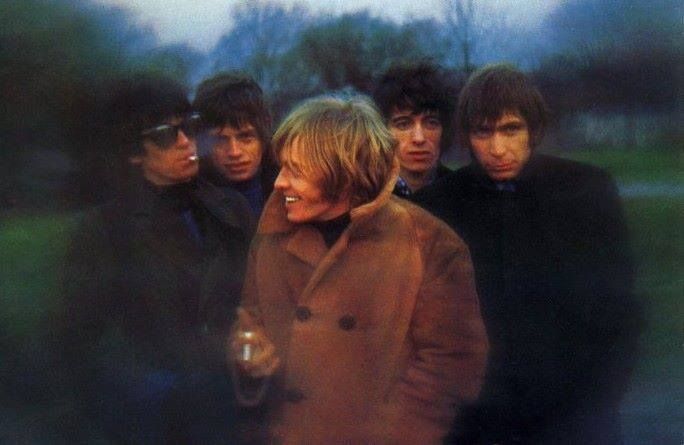 “I don't like Between the Buttons very much,” said Jagger the following year. It just isn't any good. Back Street Girl is about the only one I like.”
“I don't like Between the Buttons very much,” said Jagger the following year. It just isn't any good. Back Street Girl is about the only one I like.”
But, in retrospect, whether it be the organ intro by Jones on She Smiled Sweetly or the slight move towards country and psychedelic pop, Between the Buttons anticipated various directions the Stones would take after Satanic Majesties and the departure of the increasingly damaged and unpredictable Jones two years later.
Between the Buttons isn't a classic Rolling Stones and its UK version didn't spring a single.
But although it divided critics – acclaimed wildly in the US, more derided in the UK as written off as “vaudevillian Kinks outtakes” by Roy Carr – it is more interesting than a footnote.
Then as now it divides opinion, although mostly goes unheard and marginalised in Stones' histories as if it never happened.
But it did and was infinitely better than the album which followed and, by not having a hit single in the UK version, showed the Rolling Stones were willing to take risks and alienate their pop audience.
.
You can hear the UK version of Between the Buttons on Spotify here.
.
Elsewhere occasionally revisits albums -- classics sometimes, but more often oddities or overlooked albums by major artists -- and you can find a number of them starting here


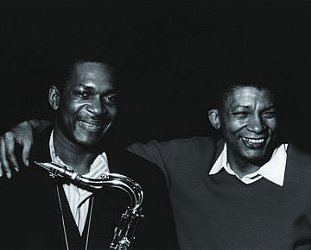

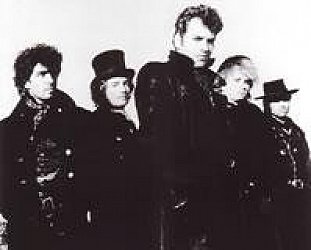
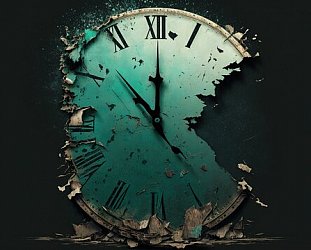
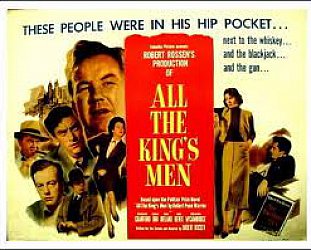
post a comment